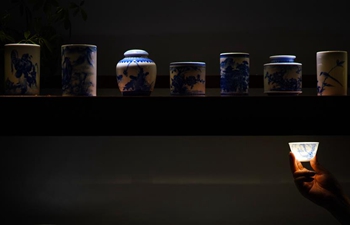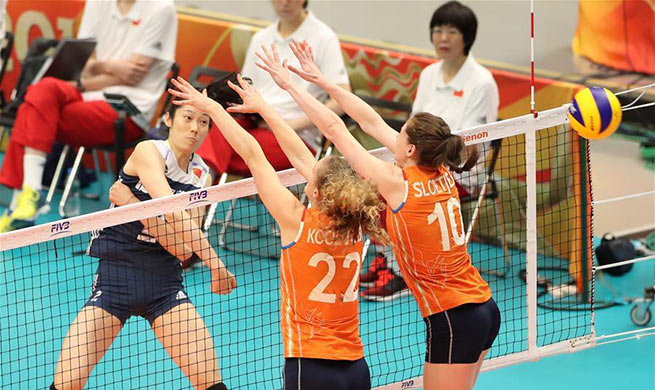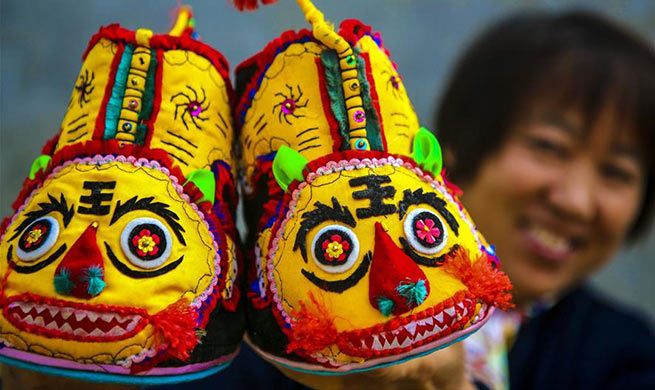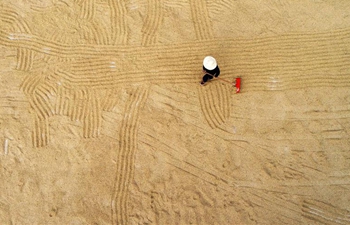by Xinhua writers Wei Donghua, Luan Xiang and Cheng Lu
HANGZHOU, Oct. 21 (Xinhua) -- Shan Tingting is 23 years old. She lives in a nursing home.
Every day after work, she catches the bus, and in half an hour arrives home, where her fellow tenants - mostly elderly and several youngsters - greet her return at "Sunny Home," a senior care center in the Binjiang District of Hangzhou, China's eastern Zhejiang Province.
Shan says she is both a volunteer and a beneficiary of an innovative program called "Companionship is the long-lasting expression of love."
About two months ago, Shan read about a retirement home looking for young people, who couldn't afford to purchase an apartment of their own, to rent vacant, fully furnished rooms at the facility for only 300 yuan (43 U.S. Dollars) a month.
The location was ideal, the room was spacious with additional services, and the rent was scandalously cheap, unimaginable in the eastern metropolis.
The only condition was that the young people would have to spend 20 hours every month keeping the seniors company, either through casual chat, reading a book or teaching them how to use smartphones.
For many young professionals struggling to survive in the big cities, this is an offer too tempting to reject.
Yang Yunhai, 29, and his associate run a workshop in Hangzhou, teaching traditional ink painting and calligraphy. He used to live in his art studio, but it had grown inconvenient and rent for a single-room studio was 1,400 yuan, a bit beyond his budget.
At Sunny Home, the monthly rent of 300 yuan wouldn't be enough to cover his studio's gas and water bills, he told Xinhua.
"I used to teach children before I moved in. I thought I could take the opportunity to gain some experience teaching grown-ups here," he said.
Almost instantly, his teaching skills won him the title of "Teacher Big Hai" and enormous popularity among his elderly disciples.
A calligraphy room is set up on every floor of the home, which has a capacity of 2,000 seniors, located by the scenic Baima (White Horse) Lake.
Every Saturday at 2 p.m. sharp, Yang's calligraphy class began with an ever expanding group of enthusiastic seniors.
There were around 30 participants when the project first started, which has since doubled since Yang's first class.
Teacher Big Hai is now so big that he has to tour from one practice group to another, whenever he can squeeze time out of his work schedule.
Grandma Chi, 77, said she had always found calligraphy fascinating. "I had been wanting to learn since I was a young girl, but never had the chance."
Now she has become one of Teacher Big Hai's most earnest pupils.
Shan doesn't teach calligraphy. Instead, she offers English lessons at Sunny Home.
"I was surprised by the enthusiasm of our elderly to learn a new language," she said.
In and out of class, the youngsters are always patient and encouraging, for their students sometimes have trouble hearing or reading clearly; while the elderly feel rejuvenated from the energetic presence of their young friends.
"This program aims to encourage the two generations to have warm, positive interactions to inspire what we'd call 'intergenerational communication,'" said Wang Kai, director of social work at Sunny Home.
It was created jointly by the senior care center and the local civil affairs authorities as a solution to mitigating the challenges posed by an aging population in China.
Due to longer life expectancy and declining fertility rates, the proportion of people above the age of 60 is growing faster than other age groups in many countries.
China is among those with an aging population. By the end of 2017, China had 241 million people over 60 years old, accounting for 17.3 percent of the country's total population.
This number is expected to peak at 487 million around 2050, making up 34.9 percent of the total population by then.
The growing senior population is a sign of the country's health and medical improvements. But the elderly need more choices of social activities to live happy and healthy lives.
Honoring the tradition of filial piety in the face of its aging population, China has been working to better protect elderly's rights and interests, including legal amendments that require citizens to visit their elderly parents and not to ignore their spiritual needs.
"This out-of-the-box thinking has helped promote the development of senior care services," said Zhuo Yongyue, director of integrated medical care and senior care under the China Association of Social Welfare and Senior Service.
"By recruiting young people as resident volunteers at a significantly lower rent price, it injects a flow of vibrant energy into the otherwise monotonous home as well as improves the young people's quality of life."
The mingling of the old and young also pushes the care center to improve its service quality and to cater to increasing client demands for more refined and personalized services, said the chairman of Green Healthcare Group, operator of the companionship program.
The program also sets an example to help encourage society to care for our elderly, he said.
Sunny Home houses 14 volunteers despite the fact that rooms in nursing homes are still scarce and in high demand.
The youngest of all is Wu Kai, who was born in 1998. Raised by his grandparents, the 20-year-old college student feels naturally close to the senior "homies."
"I hope to work in senior care or related sectors after I graduate," Kai said. "It is a privilege for me to spend time with the elderly."
"After all, we will all grow old someday," he said.
And the sentiment is mutual as the benefits go both ways.
Grandpa Hao who lives upstairs to Yang has become a close friend despite the age difference. In Yang's absence, the grandfather who has begun to suffer mild memory loss would search the complex asking: "Where did Teacher Big Hai go?"
When Teacher Big Hai works overtime, Grandpa Hao saves an egg from his supper or buy some fruit for the young man after he gets home.
"While sharing their savvy mastery of smartphone apps and the Internet, the youngsters learn from the rich life experience of the older generation," said Jia Ximin, PR manager of Sunny Home.
"The elderly treat us as if we were their own children," Shan said. "They even want to spoil us by offering to do our laundry!"
Yang said: "If one day I get married and move out, I will always come back to visit and do calligraphy with them."

















